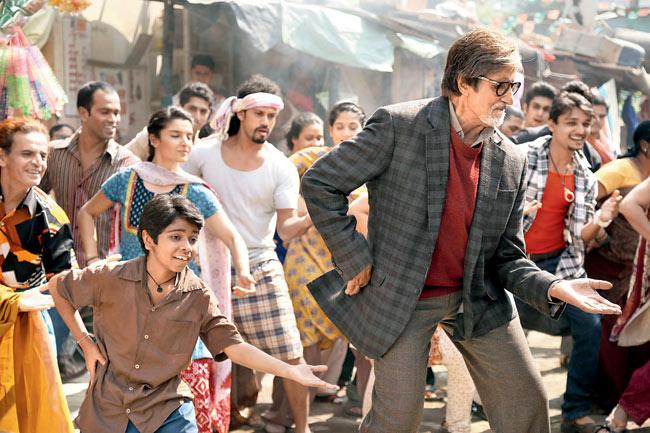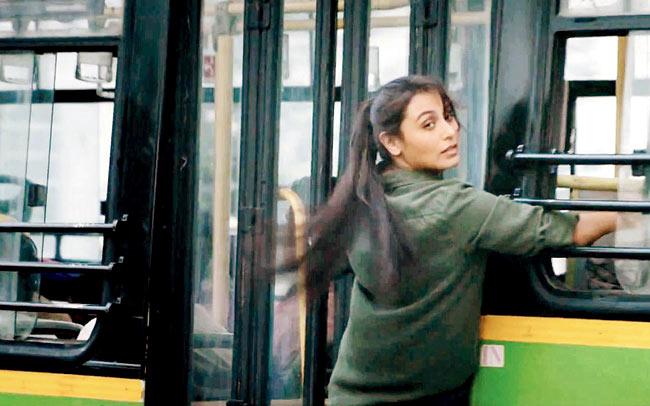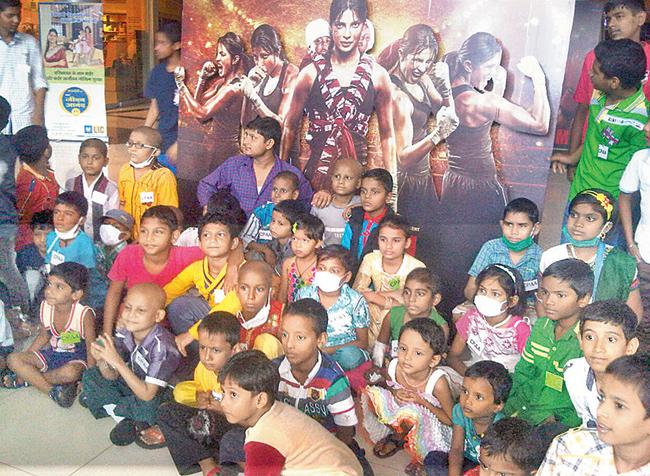The trend of tax-free films is not a recent phenomenon, but the manner in which, of late, tax exemptions are being granted is intriguing. We take a look at how these exemptions are granted

Bollywood, tax free, Priyanka Chopra, Mary Kom, Bhootnath Returns, Bhaag Milkha Bhaag, Rani Mukerji, Mardaani, Cancer-afflicted children, National Award-winning documentary Katiyabaaz,Taare Zameen Par, tax-free films, tax exemptions
The Priyanka Chopra-starrer Mary Kom was declared tax free in many states of India even before its release. This was a first as prior to this, no movie had got an exemption from tax before its release. Similarly, Rani Mukerji’s action thriller Mardaani is India’s first film with an ‘A’ certificate to be exempted from tax, solely for its bold and sensitive handling of of human trafficking.
ADVERTISEMENT

Priyanka Chopra (left) essayed the role of boxing champion Mary Kom (right) in the latter’s biopic Mary Kom. The movie was declared tax free in Maharashtra, UP and Rajasthan
The trend of tax-free films is not a recent phenomenon, but the manner in which, of late, tax exemptions are being granted is intriguing. As per experts, there are no set parameters. The onus is on the government to judge films based on the social and motivational message it conveys.
Kulmeet Makkar, chief executive officer, Film and Television Producers Guild of India, says, “The different state governments occasionally grant entertainment tax exemption on the basis of the subject of the film, with the objective that it is seen by a large number of people including the audiences from smallers cities.”

Bhootnath Returns was declared tax free in Uttar Pradesh
He adds, “There is no formal process in place to obtain such exemption. It is done on a case-to-case basis depending on the access the filmmaker may have with the various state governments. The entertainment tax levied by various states on Hindi films is extremely high and by giving entertainment tax exemption, the ticket price becomes more affordable for the larger section of the audience. A significant portion of the ticket fare, across the country, goes to the government. Thus, ticket prices are always high. For example, Maharashtra government levies up to 45 per cent as entertainment tax and Uttar Pradesh levies up to 67 per cent as entertainment tax on Hindi films.”

Bhaag Milkha Bhaag (2013) was tax free in Maharashtra and MP
Makkar further states, “The ticket prices for regional language cinema is much lower, as the entertainment tax on regional films is either exempted or subsidised by many states. Unfortunately, Hindi films are not considered as their language by majority of the Indian states including Maharashtra which is home to the Hindi film industry.”
Ironic but true, that Bollywood which is a thriving industry is not getting as much support as regional films. But again, it’s the industry that gives fantastic revenue from its national as well as overseas collections. The R100 crore-200 crore collections is evidence enough of its popularity.

Rani Mukerji in Mardaani, which explored the sensitive issue of child trafficking
Motivating message
Omung Kumar, who directed Mary Kom confirms, that it was the content of the film which fetched it the tax exemption. The film, which is based on the life of Olympic boxing champ Mary Kom, was a motivational story for every Indian. He says “It was inspiring for all the youngsters and women who empathised with Mary Kom’s struggles and victory. I received reports of how students were taken to theatres to draw inspiration from the film. Similarly, an NGO took around 150 cancer patients to see the film to motivate them to tide over their problems and emerge victorious. The producers of the film showed the movie to the government officials and got the necessary exemption in Uttar Pradesh, Rajasthan, Gujarat and Mumbai.”

Cancer-afflicted children watching a screening of Mary Kom in Mumbai
The director, however, states that he didn’t make the movie with the intention of getting a tax-free tag. “The subject just felt right and the finished product had an inspirational quality to get the exemption on its own. But I can’t deny that the exemption did help the film get a wider reach,” he explains.

Taare Zameen Par, which dealt with learning disorder dyslexia, was tax free in Maharashtra
A brief history
Tax exemption on films began in the ’70s and was a common feature till the ’80s. One of the earlier films to be granted entertainment tax exemption in Maharashtra was Manoj Kumar’s Shirdi Ke Sai Baba (1977) as it advocated communal harmony. The low cost of the tickets and the strong religious content made the film a super success. Similarly, there were films with social messages like Mehmood’s Kunwara Baap (1974) which stressed on polio vaccination, Sunil Dutt’s Dard Ka Rishta (1982) which highlighted the need for a cure for cancer and Raj Kapoor’s Heena (1991) which spoke of the Indo-Pak relations.
This trend, however, saw a decline in the ’90s. This might be because the films were bereft of social messages, but socially-relevant movies resurfaced with films such as Taare Zameen Par and Rang De Basanti to name a few.

The UP government granted tax exemption to the National Award-winning documentary Katiyabaaz
The present scenario
Not so long ago, films such as Paan Singh Tomar (2012) and Bhaag Milkha Bhaag (2013) were awarded tax exemption, owing to the motivational stories of the Indian sportsmen who brought laurels to India despite extreme struggles. The documentary Katiyabaaz (electricity thief), directed by Deepti Kakkar and Fahad Mustafa exposing the rampant electricity theft in the country, was also granted exemption. Recently, the Rani Mukerji-starrer Mardaani was declared tax-free in Madhya Pradesh, Uttar Pradesh and Maharashtra as it raises awareness about the trafficking of young girls in the country. Trade analyst Komal Nahata says, “There is no uniform blanket over all states regarding the criterion for selecting a film. It’s always for a deserving film — a patriotic film, one which tackles social issues or propagates communal harmony.”
He continues, “Different states have different tax-free policies. Like in Gujarat, all Gujarati films are exempted from entertainment tax. Likewise, in Punjab, entertainment tax on Punjabi films has been abolished. Rajasthani films used to be exempted from entertainment tax a few years back. As for Bollywood films, only ‘deserving’ films are exempted from entertainment tax in different states. As far as Maharashtra is concerned, the government has levied an entertainment tax of about 40 per cent which means that if the ticket rate is Rs 100, the government tax will make it worth Rs 140 when it reaches the movie goer.” It’s no doubt a sizeable chunk of the collection.
Eating the cake
When films are declared tax-free, obviously the benefit should go to the producer as more people will watch the film at subsidised rates. But this is far from ground reality. Nahata offers an explanation, “When a tax-free film is doing well, theatres increase the net admission rate, which means a ticket costing Rs 140 (which is inclusive of the '40 entertainment tax) is still available at the same rate, the profits of which are eventually pocketed by the theatre owners. The producer gets the benefit of more people watching the film but the audience doesn’t benefit at all.”
If so, why aren’t there any protests against the same, we wonder? Nahata says, “Most of the times, people don’t care much as they have to pay the same amount eventually. The reason that they are not addressed at public forums is that tax free films are far and few. Also, there is no law that prevents theatre owners from increasing the ticket prices at their whim. They can be increased at any time without any prior intimation to anyone.”
(With inputs from Bharati Dubey)
 Subscribe today by clicking the link and stay updated with the latest news!" Click here!
Subscribe today by clicking the link and stay updated with the latest news!" Click here!






